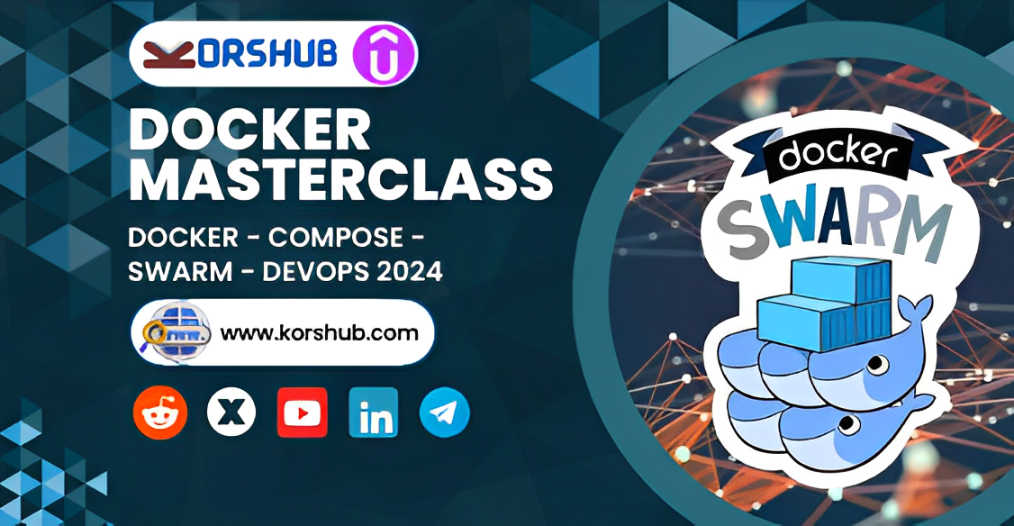The world of software development and deployment is rapidly evolving, with Docker emerging as a game-changer in the realm of DevOps. Docker provides a streamlined approach to containerization, allowing developers to build, ship, and run applications efficiently across different environments. In this comprehensive Docker MasterClass, we delve into Docker's core concepts, Docker Compose, Docker Swarm, and how these technologies integrate into modern DevOps practices.
Introduction to Docker
What is Docker?
Docker is an open-source platform designed to automate the deployment of applications within lightweight, portable containers. Unlike traditional virtual machines, Docker containers virtualize the operating system at the application level, making them faster and more resource-efficient.
Importance of Docker in DevOps
Docker plays a pivotal role in DevOps by enabling consistent environments across development, testing, and production stages. It fosters collaboration between teams, streamlines workflows, and accelerates the deployment of applications.
Docker Basics
Docker Containers vs. Virtual Machines
Docker containers share the host system's kernel, resulting in reduced overhead and faster startup times compared to virtual machines. They encapsulate dependencies and configurations, ensuring consistent behavior regardless of the deployment environment.
Docker Images and Registries
Docker images serve as templates for containers, containing all the necessary files, libraries, and dependencies to run an application. Docker Hub and private registries facilitate the distribution and sharing of Docker images.
Getting Started with Docker
Installing Docker
Begin by installing Docker on your preferred operating system—Windows, macOS, or Linux. Docker provides straightforward installation packages that include the Docker Engine, Docker CLI, and Docker Compose.
Running Your First Docker Container
Once Docker is installed, pull a pre-built image from Docker Hub and instantiate it as a container using simple commands. Explore the Docker CLI to manage containers, networks, and volumes.
Docker Compose
What is Docker Compose?
Docker Compose is a tool for defining and running multi-container Docker applications. It uses a YAML file to configure services, networks, and volumes, enabling developers to define complex application architectures.
Creating Multi-Container Applications with Compose
Compose simplifies the orchestration of interconnected services. Define services, set dependencies, and manage application lifecycles using Compose commands like docker-compose up and docker-compose down.
Advanced Docker Compose
Scaling Services
Utilize Compose to scale services horizontally by adjusting the number of container instances. Implement load balancing and fault tolerance with Compose.
Environment Variables and Networking
Customize container environments using Compose's support for environment variables and networking configurations. Define network aliases, expose ports, and control service interactions.
Docker Swarm
Introduction to Docker Swarm
Docker Swarm is Docker's native clustering and orchestration tool, enabling the creation and management of a cluster of Docker nodes. Swarm simplifies scaling, load balancing, and service discovery.
Setting Up a Swarm Cluster
Initiate a Docker Swarm cluster by designating nodes as managers and workers. Swarm uses a decentralized design, ensuring high availability and fault tolerance.
Deploying Applications with Docker Swarm
Deploying Services
Utilize Docker Swarm to deploy services across the cluster. Define desired state configurations, including service replicas, resource constraints, and health checks.
Managing Swarm Services
Monitor and manage Swarm services using Docker CLI or Docker Swarm commands. Scale services, update configurations, and perform rolling updates seamlessly.
DevOps with Docker
Docker in Continuous Integration/Continuous Deployment (CI/CD)
Integrate Docker into CI/CD pipelines to automate software delivery. Use Docker images for build environments, testing, and deployment stages.
Integrating Docker with Jenkins
Leverage Jenkins and Docker to implement robust CI/CD workflows. Use Jenkins pipelines to build, test, and deploy Dockerized applications.
Monitoring and Logging
Using Prometheus and Grafana
Implement monitoring solutions with Prometheus for metrics collection and Grafana for visualization. Monitor container health, resource utilization, and application performance.
Logging Best Practices with Docker
Centralize container logs using tools like Fluentd or ELK stack. Configure logging drivers and manage log aggregation for efficient troubleshooting.
Security Best Practices
Container Security
Implement container security best practices, such as image scanning, vulnerability management, and least privilege principles. Use Docker Security Benchmarks for hardening containers.
Securing Docker Swarm
Secure Docker Swarm clusters with mutual TLS authentication, role-based access control (RBAC), and network segmentation. Apply security patches and regularly update Docker components.
Docker in Production
High Availability and Load Balancing
Design high-availability architectures using Docker Swarm. Configure load balancing with built-in Swarm features or external solutions like HAProxy.
Backups and Disaster Recovery
Implement backup strategies for Dockerized applications, including data volume backups and periodic snapshots—plan disaster recovery procedures to minimize downtime.
Use Cases and Examples
Real-world Applications of Docker
Explore use cases across industries, including microservices architectures, legacy application modernization, and edge computing deployments.
Case Studies
Analyze successful Docker adoption stories from leading organizations. Learn from practical examples of Docker implementations and their impact on business outcomes.
Future of Docker and DevOps
Trends and Innovations
Discuss emerging trends in containerization and orchestration technologies. Explore the evolving role of Docker in the DevOps ecosystem.
Kubernetes vs. Docker Swarm
Compare Docker Swarm with Kubernetes, another popular container orchestration platform. Understand use cases and considerations for choosing between the two.
Conclusion
In conclusion, mastering Docker, Docker Compose, Docker Swarm, and their integration into DevOps workflows empowers teams to build, deploy, and scale applications efficiently. Embrace containerization technologies to accelerate software delivery, enhance collaboration, and future-proof your infrastructure.





